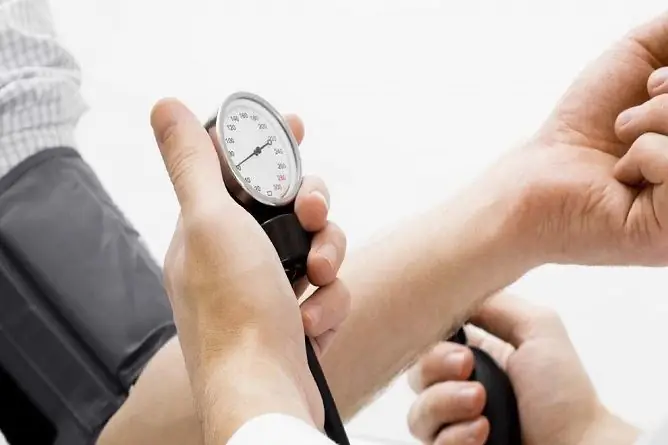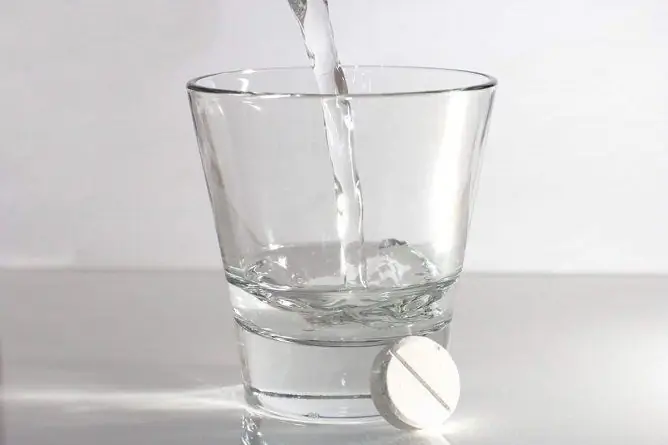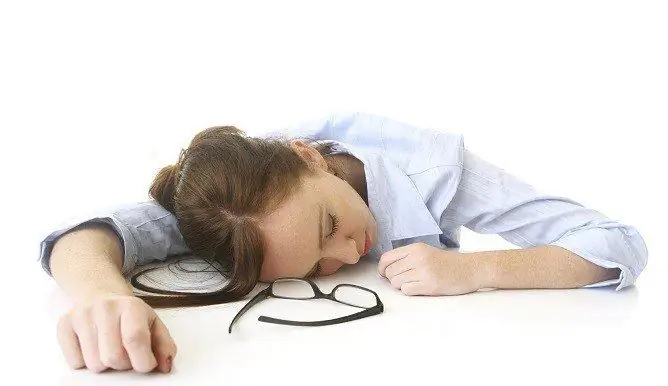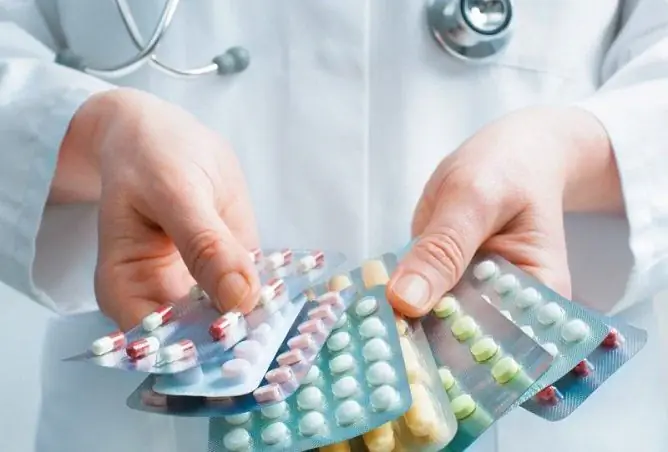- Author Rachel Wainwright wainwright@abchealthonline.com.
- Public 2023-12-15 07:39.
- Last modified 2025-11-02 20:14.
Pressure normalization: tablets that normalize high and low blood pressure
The content of the article:
- Blood pressure pills for hypertension
- Hypotension blood pressure pills
- When you need to take drugs to normalize blood pressure
- Increasing and decreasing pressure
- Video
Tablets to normalize blood pressure are prescribed for both hyper- and hypotension. Since they all affect important processes in the body, their intake requires mandatory agreement with a doctor.

All drugs that normalize blood pressure must be taken while monitoring the blood pressure
Blood pressure pills for hypertension
To stabilize high blood pressure, drugs of the following groups are used: diuretics, beta-blockers, angiotensin converting enzyme (ACE) inhibitors, angiotensin receptor blockers, calcium antagonists, alpha-blockers, agonists of central alpha2- and imidazoline receptors, sympatholytics and renin vasoperators actions.
What kind of remedies should you drink to lower blood pressure and get rid of unpleasant symptoms? Their list in alphabetical order from A to Z is given in medical reference books. Many of the names on this list come in the form of injections or infusion solutions, but here are tablets that are easy to use at home. It must be remembered that taking any medication must be agreed with your doctor. Almost all blood pressure medications are prescription drugs (with a few exceptions).

Hydrochlorothiazide is a medium-strength diuretic
Hydrochlorothiazide is a moderately potent diuretic. Blocks carbonic anhydrase in the nephrons of the kidneys, and because of which potassium ions are retained, and sodium absorption is reduced. Sodium pulls water with it, so diuresis increases, and the volume of circulating blood (BCC) decreases. Retention of sodium in the body is associated with increased excretion of potassium, therefore, with prolonged use, the drug leads to a deficiency of potassium in the blood plasma. In addition, the action of this drug is not too fast; for a pronounced effect, a daily intake is required.

Indapamide is a non-thiazide diuretic
Indapamide (Indap, Arifon) is a moderately active non-thiazide diuretic. The drug of choice for every day, which is sufficiently effective, does not cause many side effects typical for drugs in this group, since the loss of ions when taking Indapamide is insignificant. However, like any other diuretic, it is insufficient for the treatment of hypertension, therapy should be supplemented with other drugs, because a decrease in the BCC removes only the symptoms without eliminating the cause of the disease.

Furosemide is a diuretic for forced diuresis
Furosemide is a fast and powerful diuretic that has excellent reviews as an emergency drug. The action occurs within 10-15 minutes after ingestion and lasts several hours, that is, it causes forced diuresis. During this time, the body can lose a significant amount of trace elements, therefore Furosemide is not used for long courses.

Propranolol is also known as Anaprilin
Propranolol is an indiscriminate beta-blocker, that is, it has an inhibitory effect on the beta receptors of the heart. By reducing the excitability of the cardiac muscle conduction system, it reduces the likelihood of arrhythmias and reduces the minute blood output and the force of heart contractions. Therefore, when it is taken, the upper, systolic pressure, the so-called heart pressure, decreases.

Atenolol has a selective effect on the cardiovascular system
Atenolol is a selective beta-receptor blocker, that is, it has a selective effect only on the heart and blood vessels, while not affecting the bronchial tree and its tone in any way.

Metoprolol belongs to beta-blockers
Talinolol (Cordanum) - due to its convenient form of pills, in case of hypertension, it can be used anywhere - on the street, at work or at home. An effective remedy for restoring normal blood pressure levels, but not without side effects, especially if taken incorrectly.
Metoprolol - acts similarly to talinolol, but has a broader spectrum of action. In addition to direct action on adrenergic receptors, it reflexively reduces the load on the heart muscle, which leads to a decrease in preload and, consequently, cardiac output.

Captopril - blocks the vasoconstrictor and promotes the release of the vasodilator
Captopril (Capoten) - belongs to the group of angiotensin-converting enzyme blockers, one of the most powerful vasoconstrictor substances that are produced in the body. Blocks the transition of angiotensin I to angiotensin II, it is the best way to reduce pathologically high blood pressure. In addition, it provokes the release of bradykinin, a vasodilating agent. The maximum decrease in pressure occurs rather quickly, 60-70 minutes after taking the pill. Contraindicated in severe forms of renal failure and under 18 years of age.

Enalapril provides prolonged action
Enalapril (Enap, Renitek) - This pressure stabilizer has a long-lasting effect that can last 24 hours or more. Blocks the endocrine link of pathogenesis when the renin-angiotensin-aldosterone system is activated, reducing the sensitivity of the vessels and tubules of the kidneys to the action of aldosterone and catecholamines.

Andipal is a combined drug with antihypertensive and analgesic effects
Andipal is a combined drug that, in addition to non-steroidal anti-inflammatory drugs, contains bendazole and papaverine. These are substances that have an antispasmodic and reflex vasodilator, hypotensive effect.

Nifedipine is a calcium antagonist
Nifedipine is a calcium antagonist that blocks the receptor, preventing calcium ions from joining its active center. It relieves essential hypertension, is most effective in combination with beta-blockers. It has a number of contraindications: it should not be used in childhood, during lactation or pregnancy, with hypovolemia, aortic stenosis, after myocardial infarction.

Amlodipine has a vasodilating effect
Amlodipine - affects the peripheral vessels, producing a strong vasodilator effect. This is due to the blockade of the movement of calcium ions into the cell, due to which the work of the smooth muscle fiber of the vascular wall is weakened. Amlodipine affects the reaction rate, therefore it is not recommended for people whose work requires increased attention and concentration.

Clonidine requires special care in its use, it is rarely used now
Clonidine is an antiquated yet powerful remedy. At first, it activates peripheral alpha2-adrenergic receptors and increases hypertension for 40 minutes, but after penetrating the blood-brain barrier, it activates central receptors and rapidly reduces the tone of peripheral vessels, which causes the pressure to drop rapidly. Clonidine requires an accurate dosage, since even in extreme conditions of hypertension, its overdose can cause hypotension and collapse.

Moxonidine - reduces blood pressure by acting on receptors in the central nervous system
Moxonidine - has a similar mechanism and pharmacodynamics, but with one difference - it acts on imidazoline receptors in the central nervous system. It is one of the main mechanisms in the blood pressure control system and is responsible for vascular tone.

Losartan - a new generation pressure drug
Losartan, Aliskiren - new generation antihypertensive drugs. The first is an angiotensin receptor blocker, which guarantees a smooth but significant decrease in blood pressure. The second belongs to human renin inhibitors, effective in all forms of arterial hypertension.
The pills that lower blood pressure also include antispasmodics - Papaverine hydrochloride, No-Shpa, Dibazol, Apressin.
Hypotension blood pressure pills
Hypotension is less common than hypertension, but is easier to relieve. To restore normal pressure, the following groups of drugs are taken: alpha-adrenergic tags, synthetic analeptics and natural adaptogens with a pronounced antihypotensive effect.

Citramone increases blood pressure due to caffeine in its composition
Citramon - differs in availability and prevalence, it is in almost every home. The hypertensive effect of citramone is produced by the caffeine included in its composition. It activates the vasomotor centers in the medulla oblongata, which increases the tone of peripheral vessels and normalizes the pressure. Citramon should not be abused due to the active effect of aspirin and paracetamol in its composition on the enzyme systems of the body - this can lead to peptic ulcer disease and other undesirable consequences.

Many anti-influenza drugs contain phenylephedrine, which increases blood pressure
Phenylephrine is a direct agonist (activator) of alpha-adrenergic receptors in the walls of blood vessels, causing them to contract. This is the best remedy for combating vascular insufficiency, vegetative-vascular dystonia and hypotension, it is used in the form of Mezaton injection solution. Adrenergic activation leads to a narrowing of the lumen, an increase in tone and, as a result, the restoration of normal blood pressure levels. As an active ingredient, it is a part of many medicines, especially anti-influenza (Antiflu, Coldrex, Teraflu).

Gutron is a drug from the group of alpha-adrenergic agonists
Gutron - its active ingredient is midodrin, an active alpha-adrenergic agonist. At the same time, the agent does not affect either the strength and frequency of heart contractions, or the state of the bronchi (Mesaton, for example, is capable of acting on beta-adrenergic receptors, causing tachycardia).

Caffeine-sodium benzoate has an effect similar to coffee, since it has the same active ingredient
Caffeine-sodium benzoate is a synthetic caffeine in a convenient pill form. Refers to a group of stimulants of the vasomotor (vasomotor) center, called analeptics. Affects the central nervous system, producing an activating effect, leads to a noticeable increase in the tone of the smooth muscle membrane of the vessels, allowing you to increase the pressure. Caffeine does not show side effects, except in cases of overdose - then limb tremors and tachycardia are possible.

Ephedrine hydrochloride is an effective stimulant
Ephedrine hydrochloride - acts on adrenergic receptors, increasing the strength and speed of heart contractions, as well as increasing cardiac output, which increases upper pressure. It affects diastolic pressure to a lesser extent, but also interacts with the alpha receptors of the vessels, increasing their tone, causing them to contract and thereby increasing blood pressure.
An effective and safe way to return low blood pressure to normal is the use of herbal preparations and natural extracts belonging to the group of adaptogens. Adaptogens are drugs with a pronounced tonic, hypertensive and regenerating effect. These include tinctures and liquid extracts of ginseng, Eleutherococcus, Rhodiola rosea, Schisandra chinensis. These are extracts from various parts of medicinal plants that can be added to weak tea or water. They have a stimulating effect on the body, smoothly increase pressure, invigorate. An effective drug in this group is Pantokrin, made from deer patches. It has a powerful effect on the cardiovascular system, increasing heart rate and vascular tone.

Pantokrin - natural stimulant, adaptogen
When you need to take drugs to normalize blood pressure
Changes in the normal level of blood pressure sooner or later affect everyone. Arterial hypertension is more common - a persistent and prolonged increase in pressure, but hypotension, that is, a decrease in it, is quite common. The problem is that high pressure, which persists for a long period of time, leads to deformation of the vessel walls, a change in their qualitative composition and, consequently, a decrease in elasticity and strength. It is hypertension that is usually the first harbinger of diseases of the cardiovascular system, such as myocardial infarction, stroke, transient ischemic attack. The defeat of the shock organs with the highest blood circulation leads to all sorts of failures, such as renal or cardiac (they are most common).
Lowering blood pressure (blood pressure) is fraught with insufficient blood circulation, primarily of the brain. A small amount of blood flowing to the key organs has a detrimental effect on their performance and homeostasis.
Therefore, any pathology associated with pressure cannot be ignored.
Increasing and decreasing pressure
An increase in blood pressure is called hypertension, and it can be primary or secondary. Primary, or essential, arterial hypertension accounts for 90% of cases of increased blood pressure, arises against the background of excessive emotional stress, stress, atherosclerotic changes in the walls of blood vessels, changes in the rheological properties of blood due to bad habits or taking medications, sleep disorders and a large number of other risk factors. The leading mechanism in its occurrence is an imbalance between peripheral vascular resistance, the blood pressure control system and changes in the value of cardiac output. Secondary hypertension is much less common and is caused by a disruption in the work of the endocrine glands or kidneys, organ failure.
A decrease in blood pressure, hypotension, can occur both independently and without pathological prerequisites, and as a result of the action of an aggressive environmental factor, and in critical conditions - with shock, burn injury, massive bleeding. A sharp drop in blood pressure can lead to collapse, which is accompanied by loss of consciousness and damage to important organs.
Subjective sensations inherent in high or low blood pressure are:
- painful sensations in the region of the heart;
- headaches;
- noise, ringing in the ears;
- flies, darkening before the eyes;
- a feeling of pulsation in the temples, strengthening or weakening of the pulse in the hands;
- weakness, drowsiness, dizziness.
Regardless of the sensations experienced by the patient, the decisive factor in the diagnosis and prescription of pills to normalize blood pressure is daily monitoring of blood pressure.
Video
We offer for viewing a video on the topic of the article.

Nikita Gaidukov About the author
Education: 4th year student of the Faculty of Medicine No. 1, specializing in General Medicine, Vinnitsa National Medical University. N. I. Pirogov.
Work experience: Nurse of the cardiology department of the Tyachiv Regional Hospital No. 1, geneticist / molecular biologist in the Polymerase Chain Reaction Laboratory at VNMU named after N. I. Pirogov.
Found a mistake in the text? Select it and press Ctrl + Enter.






